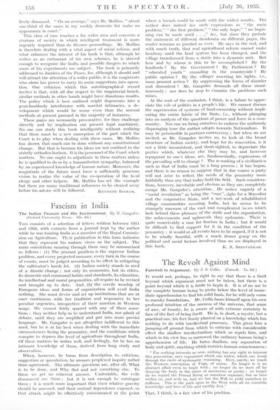Fascism in India
The Indian Peasant and His Environment. By N. Gangulee. (Oxford University Press. 108. 6d.) Tnis consists of a selection of letters written between 1911 and 1983, with extracts from a journal kept by the author while he was touring India as a member of the Royal Commis- sion on Agriculture. Th?ir publication in this form indicates that they represent his mature views on the subject. The main convictions running through them may he summarized as follows : (1) The peasant problem is the supreme Indian problem, and every projected measure, every turn in the course of events, must be judged according to its effect in mitigating the cultivator's harsh lot. (2) Indian society stands in need of a drastic change ; not only its economics, but •its. ethics, its domestic and communal habits and standards, its education, its intellectual and moral propensities, all require to be revised and brought up to date. And, (3) the servile worship of European ideas and forms of organization will avail India nothing. She must devise and set up institutions that are at once continuous with her tradition and responsive to her peculiar urgencies, irrespective of their sanction in Western usage. We cannot fairly , quarrel with any of these asser- tions ; they neither help us to understand India, nor admit of debate, until they are amplified and put into more precie language. Mr. Gangulee is not altogether indifferent to this need, but he is at his best when dealing with immediate circumstances facing the peasantry, and the conditions which conspire to depress the level of agriculture throughout India. Of these matters he writes well, and feelingly, for he has an intimate knowledge of them, . derived from long study and observation.
When, however, lie turns from description to criticism, suggestion or speculation; he .arouses perplexed inquiry rather than agreement. The ultimate questions. are, after all; What is to be done, and 'Why that and not something else. To these we get no coherent answer. Undeniably, the evils denounced arc there ; but it is not enough to catalogue them ; it is much more important that their relative gravity should be assessed, and their mutual dependence exposed, so that attack might be- effectively concentrated at the point where a breach could be made with the widest results. The author does: indeed Use such' expressions as " the main problem,"," the first problem," the only hope," " no begin- ning can be made until . . .," &c., but since they prelude the statement of different desiderata on different pages, the reader remains as puzzled as ever. He says in the end, and with much truth, that real agricultural reform cannot make headway until the land system has been changed, and the village transformed from a static into a dynamic unit. But how and ,by 'whom is this to be accomplished ? By the landlords ? •By the Government ? By Parliament ? By " educated youth " crusading in the countryside ? By public opinion? By the villager asserting his rights, i.e., mass peasant action '? By suppressing the forces of disorder and discontent ? Mr. Gangulee demands • all these simul- taneously ; nor does he stop to examine the problems each raises.
At the root of the confusion, I think, is a failure to appre- ciate the role of politics in a people's life. We cannot discuss the supersession of systems of land-ownership without impli- • cating the entire fabric of the State, i.e., without plunging into an analysis of the questions of power and force in a com- munity. Nor can we bring ourselves to endorse the uniformly disparaging tone the author adopts towards Nationalism. It may be permissible in partisan controversy ; but when we are invited, as Mr. Gangulee invites • us, to look at the broad structure of Indian society, and hope for its renovation, is it not a little inconsistent, and short-sighted, to depreciate the parties which, whatever elsc they may be, and however repugnant to one's ideaa, are, fundamentally, expressions of the prevailing; will to change ? • The re-making of a civilization such as that of India,, must, be, a, long, process ; it has begun, and there is no reason to, suppose• that in due course a party
needs of .the peasantry more will not arise to reflect ,
faithfully than any that today hold the field.. Such considera- tions, however, inevitable and obvious as they are, completely escape Mr. Gangulee's attention... He writes vaguely of a "social revolution" as being the "cure",.sighs for a Mussolini and the corporative State, and a net-work of .rehabilitated village communities covering India, but he seems to be strangely unaware of the vast and complicated issues which 'lurk behind these phrases; of the strife and the organization, the achievements and upheavals they epitomize. There 'is quite conceivably a case for fascism in India ; but it would be difficult to find support for it in the condition of the peasantry ; it would at all events have to be argued, if it is not to be wholly fanciful, with a much firmer :grasp, on the political and social factors involved than we see displayed in





































 Previous page
Previous page